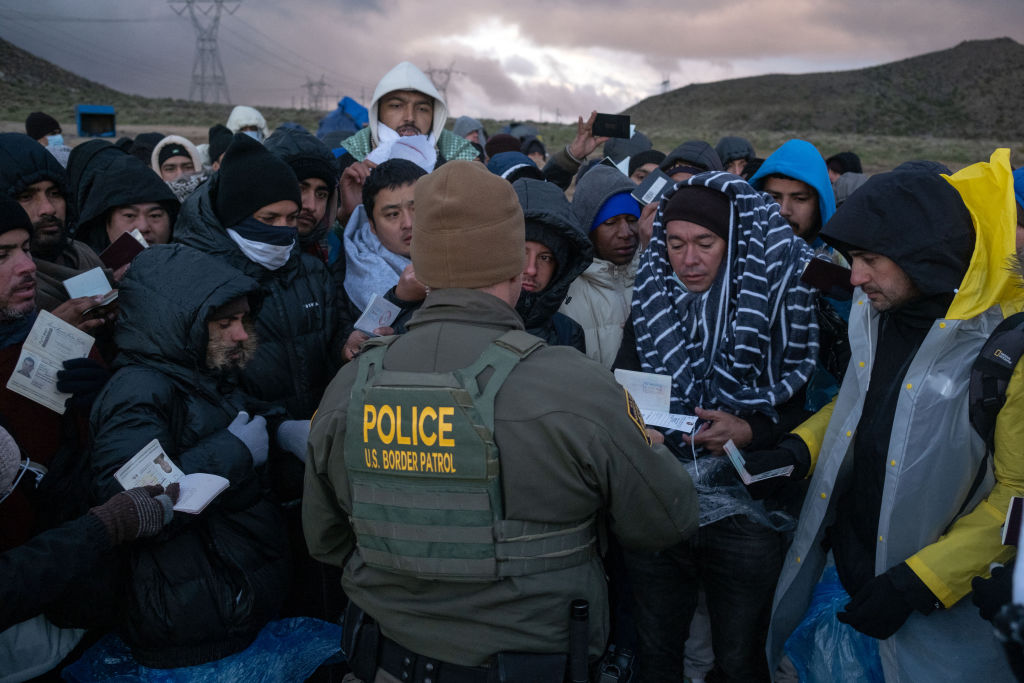Sen. James Lankford stood before a group of conservative supporters this week and bemoaned the actions of his fellow Senate Republicans. Three weeks after the failure of his efforts to negotiate a border security package to pair with more aid to Ukraine, Lankford, now in his third term representing Oklahomans, outlined why he believes his own party tanked the deal he negotiated with Sens. Chris Murphy, a Democrat, and Kyrsten Sinema, an independent.
As introduced in early February, the 370-page bill would have forced the Biden administration to clamp down on border crossings, tightened up criteria for granting migrants asylum, revised parts of the U.S. visa program, and allocated more money toward the long-trumpeted wall on the southern border. Despite conceding virtually no immigration provisions Democrats have long hoped for, the package wasn’t enough to please even his own party, Lankford said Tuesday at a Ripon Society event. “The sense of an activist base that says, ‘I want everything, or I want nothing, and nothing is better than something,’ does not align with many people across the country,” Lankford said. “Because many people across the country are saying, ‘These are hard problems. Do something. Don’t just stand there—do something.’”
Lankford, an ordained Baptist minister who spent years in youth ministry before running for Congress, sounds a lot like other evangelical Christians who responded to a new Lifeway Research survey released last week measuring attitudes on immigration and immigration reform: 77 percent said it’s either “important” or “very important” that Congress pass significant new immigration legislation this year—up 6 percent and 9 percent over similar surveys in 2022 and 2015, respectively. And 78 percent said they’d support changes to immigration law that both beef up border security and establish a pathway for legal status for immigrants already in the U.S. Among the “self-identified evangelicals” who participated in the survey—Lifeway categorized respondents who self-identify as evangelicals separately from those who subscribe to four particular theological statements—that’s even with 2022 results and up from 68 percent in 2015. The 1,010-individual sample size featured mostly white evangelicals, mostly women, and mostly those who voted for Donald Trump in 2020.
The survey points to an important political reality: Evangelical Christians are arguably the most reliable voters for a Republican party whose driving issue this year is immigration restriction. Yet the survey suggests evangelicals want “nuanced” immigration reform, the survey sponsors say: legislation that both secures the border and creates pathways to legal status for immigrants already in the U.S. illegally. And they want congressional action this year. “There’s a disconnect between what’s happening on social media—people who lost their minds over the Lankford/Sinema/Murphy bill—and reasonable Christians,” Chelsea Sobolik, director of government relations for World Relief, told The Dispatch. (World Relief, a Christian humanitarian organization, was one of the sponsors of the aforementioned survey.)
Yet despite the desired evangelicals expressed in the survey, evangelical voters generally remain loyal to Donald Trump, who is now the standard bearer of a Republican Party skewing more and more toward hardline immigration restrictions, and who has said immigrants are “poisoning the blood of our country.”
The Lankford/Murphy/Sinema bill’s failure to gain any traction in the Senate is its own object lesson in how strong the political headwinds are against what evangelical Christians say they want, according to the Lifeway survey.
Lankford began working on the immigration package in late 2023 because many lawmakers in his own party demanded more border security as a precondition to considering more aid for Ukraine. The influx at the southern border had spiraled out of control, with record-breaking numbers of encounters between border agents and border crossers.
What turned the tide against the legislation among Republicans was the political victory it would have given President Joe Biden, with Trump urging Republicans to agree only to a “perfect” deal and GOP representatives saying they had no desire to do anything that helped the incumbent president’s fortunes. Now, other lawmakers seem to think immigration reform has no chance of passing Congress any time soon, with Murphy telling The Dispatch last month that hope for reform is “dead as a doornail.”
Particularly noteworthy is that the Lankford/Murphy/Sinema bill ceded so little ground to provisions Democrats have historically insisted on in immigration reform. Previous comprehensive immigration reform efforts—in 2004, 2013, and 2016, for example—have sought to balance tighter border security with more clearly defined pathways to legal status for immigrants already in the U.S., sometimes referred to as “amnesty.” But even with the Lankford package focusing almost solely on border security—and offering the Ukraine aid as the trade-off for Democrats—fellow Republicans submarined it.
The Republican opposition to the compromise “was very disheartening to see,” Galen Carey, vice president of government relations for the National Association of Evangelicals, told The Dispatch. “The contours of this package were strikingly different” than past packages. Other than provisions for Afghans who fled following the 2021 Taliban takeover and adjustments to visas, the bill “didn’t have anything to ease things for migrants already here. Even the Dreamers have been left behind along with everybody else,” Carey said, referring to those in the country now thanks to the Deferred Action for Childhood Arrivals (DACA) program.
There are other indicators of the political zeitgeist working against what evangelical Christians indicated they’d like to see in terms of policy. The Heritage Foundation, making itself out to be one of the policy vanguards of the New Right, last year released its Mandate for Leadership 2025: The Conservative Promise, a policy blueprint for reforming the executive branch of the federal government and priorities for congressional legislation. New York Times columnist Carlos Lozada observed last week that many of the blueprint’s suggestions would beef up executive branch powers instead of shrinking them, as was once commonplace among conservative proposals. Its section covering immigration and border security would be no different, recommending the consolidation of several departments to create what would be the third-largest Cabinet-level agency to enforce border and immigration restrictions.
The Heritage Foundation project also suggests rolling back popular protections for illegal immigrants currently in the U.S., including victims of crimes. It also urges Congress to end the Flores Settlement Agreement, which limits how long the government can detain migrant children—in 2019 a federal judge blocked the Trump’s administration’s effort to rewrite the regulation during the Trump administration. The Heritage document also suggests eliminating T and U visas, which are granted to migrant victims of human trafficking. “Victimization should not be a basis for an immigration benefit,” the Heritage document reads.
Further restricting pathways to legal status is the opposite of evangelical Christians’ broader desires. In the Lifeway survey, 75 percent of evangelicals say they support immigration legislation that establishes a pathway toward citizenship for illegal immigrants in the U.S. already. More than three-quarters of evangelicals—80 percent—would support immigration reform that strengthens the border and establishes a pathway to citizenship for those here as part of DACA (referred to as “Dreamers).
Meanwhile, Republican officials have even taken legal action against Christian groups trying to provide aid to undocumented immigrants. Early last month, Texas Attorney General Ken Paxton sued Annunciation House, a Catholic ministry providing aid to immigrants crossing the southern border. Paxton—like some other conservative commentators—accused the El Paso group and others like it of harboring illegal immigrants, leading the group to countersue on the grounds that Paxton is allegedly infringing on its religious liberties. The U.S. Conference of Catholic Bishops is backing the group in its lawsuit.
The Lifeway study didn’t drill down into specific policies like Heritage’s proposals, and it didn’t ask respondents about the degree to which religious migrant aid groups should be helping immigrants who come to the U.S. illegally. But it reports that 55 percent of evangelicals say Christians have a responsibility to assist immigrants who are here illegally, and 70 percent say Christians “have a responsibility to care sacrificially for refugees and other foreigners”—highlighting the tensions inherent in evangelicals’ preference for a more nuanced and compassionate policy and their support for immigration hardliners.
So how do Christians working at the intersection of immigration policy and the church hold these realities in tension, as political commentators bring more heat than light to the issue?
“I am a pastor, and as a pastor, I’m a prisoner of hope,” Gabriel Salguero, president of the National Latino Evangelical Coalition, told The Dispatch. The coalition is another sponsor of the research conducted by Lifeway, and Salguero has been engaged in multiple rounds of immigration reform. He sees the push as a long-term battle.
Still, he’s frustrated by what happened to the Lankford bill and what it indicates about the country’s politics. “What is concerning to me beyond immigration—which is a third-rail issue in the U.S.—is that we have very few solutionists,” he said. “Many congressmen and congresswomen prefer to do press conferences than they do sitting down and legislating. We want solutionists.”
Salguero and others commenting on the Lifeway research were quick to point out to reporters last week that evangelicals have moved in one metric since Lifeway began conducting this research in 2015. In that year, only 12 percent of self-identified evangelicals said the Bible had most influenced their thinking on immigration. In 2022, that number bumped up to 21 percent, and this year, it moved up to 26 percent. But for a group that professes to believe the Bible is the inerrant word of God, that number seems shockingly low. Media ranked next at 15 percent.
“One of the formative questions is, what is driving the views on immigration?” Salguero said. “Are we gospel-centered people, as Tim Keller would say, or are we partisan-focused people?” He and others involved with the survey hope it emboldens pastors not to shy away from immigration issues in their teaching.
When it comes to partisan politics, one of the reasons the Evangelical Immigration Table and other sponsors—including World Relief, the National Association of Evangelicals, the National Latino Evangelical Coalition, and others—commissioned the survey was to underscore the notion that evangelical Christian voters are interested in something different than fringe immigration policies.
“We really wanted to get it out before Super Tuesday,” Matthew Soerens, the national coordinator of the Evangelical Immigration Table and World Relief’s vice president of advocacy and policy, told The Dispatch. “I think there’s a lane on the Republican primary side for someone who has a more nuanced view on immigration to make some headway.”
But what about Donald Trump, the likely GOP presidential nominee? What happens when he speaks out against nuanced immigration policies, as he spoke out against the Lankford bill? Soerens conceded that will probably erode evangelical support for those positions.
“But you also alienate a fair number of evangelicals on the position,” he added. “I think that makes it harder for him to win the general election.”







Please note that we at The Dispatch hold ourselves, our work, and our commenters to a higher standard than other places on the internet. We welcome comments that foster genuine debate or discussion—including comments critical of us or our work—but responses that include ad hominem attacks on fellow Dispatch members or are intended to stoke fear and anger may be moderated.
With your membership, you only have the ability to comment on The Morning Dispatch articles. Consider upgrading to join the conversation everywhere.